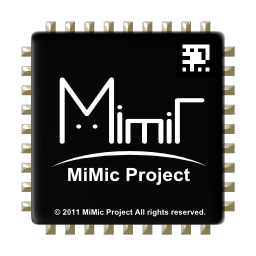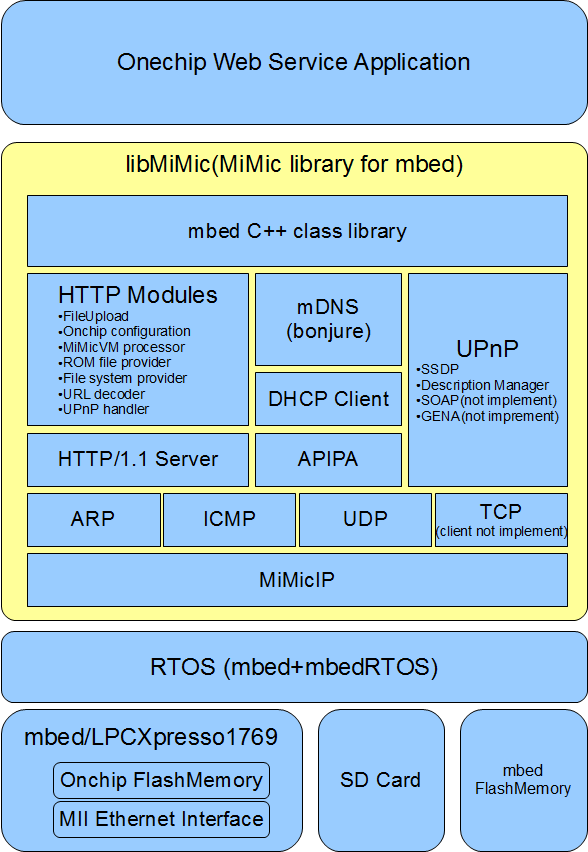This is Webservice SDK for mbed. LPCXpresso1769/LPC1768/FRDM-K64F/LPC4088
Dependents: MbedFileServer_1768MiniDK2 RedWireBridge IssueDebug_gcc MiMicRemoteMCU-for-Mbed ... more

libMiMic(MiMic library for mbed)は、WebService機能を提供するSDKです。 mbedでWebAPIに対応したネットワークデバイスを簡単に作ることが出来ます。
libMiMicはMiMic projectで開発しています。MiMic projectについてはこちらをご覧ください。 http://nyatla.jp/mimic/wp/
構成
libMiMicはmbedRTOS上で動作し、ユーザアプリケーションにAPIを提供します。コアAPIはC言語で記述されていますが、使用頻度の高いものについてはmbed向けのC++APIが準備されています。

※libMiMicはmbedの標準イーサネットドライバをしようしていません。
標準イーサネットドライバと同時に使用することはできません。
- MiMicIP - IPv4スタックです。レテンシとメモリ消費量を抑えたuipベースのライブラリです。
- ARP/ICMP/UDP/TCP - 基礎的なソケットAPIを提供します。APIは独自です。
- HTTP/1.1 Server - HTTP/1.1に対応したサーバです。マルチセッション・Chunked・持続性接続に対応しています。
- HTTP Modules - HTTP/1.1の機能モジュールです。以下のモジュールがあります。
- ROM file provider - ROMに格納したファイルイメージを公開します。
- File system provider - mbedファイルシステムを公開します。
- Onchip configuration - プログラムフラッシュを利用して設定を保存します。
- MiMicVM processor - RPCリクエスト(MiMicVM)を処理します。
- FileUpload - ファイルアップロードを受け取ります。
- URL decoder - HTTPリクエストを解析します。
- UPnP handler -UPnPメッセージを処理します。
- WebSocket - Websocketサーバです。
- mDNS - マルチキャストDNSサービスです。
- UPnP - UPnP/1.0の機能を提供します。UPnP handlerと協調して動作します。(現在はデバイス探索(SSDP)・デスクリプション(Description)のみ実装してあります。)
- DHCP/APIPA - ゼロコンフィギュレーション用のモジュールです。
- HTTP/1.1 Client
- mbed C++ class library - mbed向けのC++CPIです。C言語のものより簡単です。
対応機種
- mbed(mbed LPC1768)
- LPCXpresso1769
プログラム
Import programMiMicRemoteMCU-for-Mbed
MiMic RemoteMCU for mbed. This program provides MCU control API over REST API. It can control MCU from Javascript,PHP or any HTTP rest client directly. And, The application has self development environment.
Import programMbedFileServer
The program publishes files at local directory and SD filesystem. It is a full-fledged webServer somewhat.
サンプル
Import programMiMicSimpleHttpd
This is a simplest HTTP server made of libMiMic. It will echo back a request path.
Import programUPnPBasicDevice
Simplest UPnP basic device example. This program to run UPnP basic device on the mbed.
Import programWebSocketSample
MiMicSDK Websocket module sample program.
Import programHttpClientSamlpe
A http client sample program.
Import programTcpSocketClientSamlpe
MiMicSDK Tcp client socket sample program.
Import programUdpSocketSamlpe
Udp socket sample program. This program will send back the received packet.
チュートリアル
- HTTPD解説
- UPnPデバイスの作り方
- MiMicRemoteMCUの紹介(pdf)
- MiMicRemoteMCUのマニュアル(pdf)
English
libMiMic(MiMic library for mbed) is SDK which provides Webservice functions. It can be created networking device easily using mbed.
See more MiMic information, See MiMic project website. http://nyatla.jp/mimic/wp/
Structure
libMiMic run on mbed RTOS and provides networking API to user application. This library has C++ class API for the mbed, and low-level C language API.

For WebService general, it can be written in a simple C + + API.
libMiMic does not have the standard Ethernet driver of mbed. It is not possible that will be used with the standard Ethernet driver.
- MiMicIP - IPv4 protocol stack. This is based uip which is reduced memory and latency.
- ARP / ICMP / UDP / TCP - Those are provide basic IP protocols.
- HTTP/1.1 Server - The Http server compatible HTTP/1.1. It supports multi-session, chunked transport, persistent connection.
- HTTP Modules - There are addon-module for HTTP server. The following modules.
- ROM file module - Publish the file images in ROM.
- File system module - Publish thefiles in mbed file system.
- Onchip configuration module - To save the network settings to the program flash via REST.
- MiMicVM module - To handle the (MiMicVM) RPC request.
- FileUpload module - Accept a file via HTTP POST.
- URL dedoce module - A versatility URL decoder.
- UPnP handle module - To handle UPnP messages.
- UPnP - This provides UPnP/1.0 device functions. It works together with UPnP handler.
- Websocket - websocket (version13) server
- mDNS Service - DNS-SD protocol server.
- UPnP - This provides UPnP/1.0 device functions which works with UPnP handler. (You have been implemented (SSDP) ? description only (Description) device search now.) It is a module zero configuration for - DHCP / APIPA. mbed C + + class library - C of mbed for + + is the CPI. It is simple than that of the C language.
- DHCP/APIPA - It support zero-cpnfigulation.
- mbed C++ class library. Almost APIs for Web applications are available.
- HTTP/1.1 Client
Supported target
- mbed(mbed LPC1768)
- LPCXpresso1769
Application
Import programMiMicRemoteMCU-for-Mbed
MiMic RemoteMCU for mbed. This program provides MCU control API over REST API. It can control MCU from Javascript,PHP or any HTTP rest client directly. And, The application has self development environment.
Import programMbedFileServer
The program publishes files at local directory and SD filesystem. It is a full-fledged webServer somewhat.
Sample
Import programMiMicSimpleHttpd
This is a simplest HTTP server made of libMiMic. It will echo back a request path.
Import programUPnPBasicDevice
Simplest UPnP basic device example. This program to run UPnP basic device on the mbed.
Import programWebSocketSample
MiMicSDK Websocket module sample program.
Import programHttpClientSamlpe
A http client sample program.
Import programTcpSocketClientSamlpe
MiMicSDK Tcp client socket sample program.
Import programUdpSocketSamlpe
Udp socket sample program. This program will send back the received packet.
Tutorial
- HTTPD hello world.
- How to make own UPnP device.
- MiMicRemoteMCUの紹介(pdf)
- MiMicRemoteMCUのマニュアル(pdf)
core/driver/ethernet/lpc17xx/EthDev_LPC17xx.c
- Committer:
- nyatla
- Date:
- 2014-05-29
- Revision:
- 69:8c5f220441f5
- Parent:
- 68:f7def7eb5504
- Child:
- 91:db8279c869d3
File content as of revision 69:8c5f220441f5:
/*
* EthDev_LPC1769.c
*
* Created on: 2011/12/07
* Author: nyatla
*/
#include "NyLPC_config.h"
#if NyLPC_MCU==NyLPC_MCU_LPC17xx
#include "LPC17xx.h"
#include "EthDev_LPC17xx.h"
#include "NyLPC_os.h"
#include "LPC17xx.h"
/* If no buffers are available, then wait this long before looking again.... */
#define emacBUFFER_WAIT_DELAY_MS 3
#define emacBUFFER_WAIT_EMPTY_DELAY_MS 10
#define emacSHORT_DELAY_MS 10
//--------------------------------------------------
// common function.
//--------------------------------------------------
/**
* 送信デスクリプタを準備します。
*/
void EthDev_LPC17xx_prevTxDescriptor(void)
{
long x;
//デスクリプタの設定
for( x = 0; x < NUM_TX_FRAG; x++ )
{
TX_DESC_PACKET( x ) = ( unsigned long ) NULL;
TX_DESC_CTRL( x ) = 0;
TX_STAT_INFO( x ) = 0;
}
/* Set LPC_EMAC Transmit Descriptor Registers. */
LPC_EMAC->TxDescriptor = TX_DESC_BASE;
LPC_EMAC->TxStatus = TX_STAT_BASE;
LPC_EMAC->TxDescriptorNumber = NUM_TX_FRAG - 1;
}
/**
* 送信中のイーサフレームを処理する機会を与えて、送信キューが空くまで待ちます。
* LPC1769の場合は、非同期に更新したディスクリプタの内容から、送信メモリのフラグを更新します。
* @return
* 次に書き込むことが出来る送信キュー。
*/
static NyLPC_TUInt32 waitForTxEthFrameEmpty(void)
{
NyLPC_TUInt32 IndexNext;
struct NyLPC_TTxBufferHeader *b;
void* p;
NyLPC_TUInt32 i;
//送信キューの決定
IndexNext = (LPC_EMAC->TxProduceIndex + 1)%NUM_TX_FRAG;
//送信キューフルが解除されるまで待ち
while(IndexNext == LPC_EMAC->TxConsumeIndex)
{
//
NyLPC_cThread_sleep(emacBUFFER_WAIT_EMPTY_DELAY_MS);
}
//(TxProduceIndex+1)→TxConsumeIndexにあるデータのsentフラグを消去
for(i=IndexNext;i!=LPC_EMAC->TxConsumeIndex;i=(i+1)%NUM_TX_FRAG)
{
p=(void*)TX_DESC_PACKET(i);
if(p!=NULL){
b=((struct NyLPC_TTxBufferHeader*)p)-1;
b->is_lock=NyLPC_TUInt8_FALSE;
TX_DESC_PACKET(i)=0;
}
}
p=(void*)TX_DESC_PACKET(i);
if(p!=NULL){
b=((struct NyLPC_TTxBufferHeader*)p)-1;
b->is_lock=NyLPC_TUInt8_FALSE;
TX_DESC_PACKET(i)=0;
}
return IndexNext;
}
void EthDev_LPC17xx_processTx(void)
{
waitForTxEthFrameEmpty();
}
/**
* Ethernetパケットを送信します。
* allocTxBufで得たバッファか、NyLPC_TTxBufferHeaderのペイロード部分を指定すること。
* <p>関数仕様</p>
* この関数は、i_bufが
* </div>
*/
void EthDev_LPC17xx_sendTxEthFrame(struct NyLPC_TTxBufferHeader* i_buf,unsigned short i_size)
{
NyLPC_TUInt32 IndexNext,Index;
//サイズ0なら送信の必要なし
if(i_size == 0)
{
return;
}
//送信デスクリプタの反映
IndexNext =waitForTxEthFrameEmpty();
//送信対象のメモリブロックを送信中に設定。
// b=(i_buf+1);
//送信中のメモリブロックなら無視
if(i_buf->is_lock){
return;
}
//送信中にセット
i_buf->is_lock=NyLPC_TUInt8_TRUE;
//送信データのセット
Index = LPC_EMAC->TxProduceIndex;
if (i_size > ETH_FRAG_SIZE){
i_size = ETH_FRAG_SIZE;
}
//送信処理
TX_DESC_PACKET( Index ) = ( unsigned long )(i_buf+1);
//See UM10360.pdf Table 181. Transmit descriptor control word
TX_DESC_CTRL( Index ) = ((i_size-1) | TCTRL_LAST | TCTRL_INT );
LPC_EMAC->TxProduceIndex = IndexNext;
return;
}
/***********************************************************************
* RXバッファ
***********************************************************************/
void EthDev_LPC17xx_prevRxDescriptor(void)
{
int x;
//デスクリプタの設定
for( x = 0; x < NUM_RX_FRAG; x++ )
{
/* Allocate the next Ethernet buffer to this descriptor. */
RX_DESC_PACKET(x) = ETH_BUF(x);
RX_DESC_CTRL(x) = RCTRL_INT | ( ETH_FRAG_SIZE - 1 );
RX_STAT_INFO(x) = 0;
RX_STAT_HASHCRC(x) = 0;
}
/* Set LPC_EMAC Receive Descriptor Registers. */
LPC_EMAC->RxDescriptor = RX_DESC_BASE;
LPC_EMAC->RxStatus = RX_STAT_BASE;
LPC_EMAC->RxDescriptorNumber = NUM_RX_FRAG - 1;
}
/**
* 受信キューの先頭にあるRXフレームのポインタを返します。
* 関数は、受信キューのポインタを操作しません。続けて読み出したとしても、同じポインターを返します。
* 制限として、返却したポインタの内容は、一時的に書き換え可としてください。(この制限は将来削除します。)
* @return
* 成功した場合、受信データを格納したバッファポインターです。
* 次回nextRxEthFrameを呼び出すまで有効です。
*/
void* EthDev_LPC17xx_getRxEthFrame(unsigned short* o_len_of_data)
{
if( LPC_EMAC->RxProduceIndex != LPC_EMAC->RxConsumeIndex )
{
//受信データを返却する。
*o_len_of_data = (unsigned short)(( RX_STAT_INFO( LPC_EMAC->RxConsumeIndex ) & RINFO_SIZE ) - 3);
return ( unsigned char * ) RX_DESC_PACKET( LPC_EMAC->RxConsumeIndex );
}
return NULL;
}
/**
* 受信キューを進行します。
*/
void EthDev_LPC17xx_nextRxEthFrame(void)
{
long lIndex;
if( LPC_EMAC->RxProduceIndex != LPC_EMAC->RxConsumeIndex )
{
//キューすすめる。
lIndex = LPC_EMAC->RxConsumeIndex;
lIndex++;
if( lIndex >= NUM_RX_FRAG )
{
lIndex = 0;
}
LPC_EMAC->RxConsumeIndex = lIndex;
}
}
/*-----------------------------------------------------------*/
/*-----------------------------------------------------------*/
#define ETHDEV_PHY_DEF_ADR 0x0100 /* Default PHY device address */
NyLPC_TBool EthDev_LPC17xx_prvWritePHY( long lPhyReg, long lValue )
{
const long lMaxTime = 10;
long x;
LPC_EMAC->MCMD = 0;
LPC_EMAC->MADR = ETHDEV_PHY_DEF_ADR | lPhyReg;
LPC_EMAC->MWTD = lValue;
for( x = 0; x < lMaxTime; x++ )
{
if( ( LPC_EMAC->MIND & MIND_BUSY ) == 0 )
{
/* Operation has finished. */
break;
}
NyLPC_cThread_sleep( emacSHORT_DELAY_MS );
}
if( x < lMaxTime )
{
return NyLPC_TBool_TRUE;
}
else
{
return NyLPC_TBool_FALSE;
}
}
/*-----------------------------------------------------------*/
unsigned short EthDev_LPC17xx_prvReadPHY( unsigned int ucPhyReg, NyLPC_TBool* plStatus )
{
long x;
const long lMaxTime = 10;
LPC_EMAC->MCMD = 1;
LPC_EMAC->MADR = ETHDEV_PHY_DEF_ADR | ucPhyReg;
LPC_EMAC->MCMD = MCMD_READ;
for( x = 0; x < lMaxTime; x++ )
{
/* Operation has finished. */
if( ( LPC_EMAC->MIND & MIND_BUSY ) == 0 )
{
break;
}
NyLPC_cThread_sleep( emacSHORT_DELAY_MS );
}
LPC_EMAC->MCMD = 0;
if( x >= lMaxTime )
{
*plStatus = NyLPC_TBool_FALSE;
}
return( LPC_EMAC->MRDD );
}
#endif

 MiMic Webservice library
MiMic Webservice library